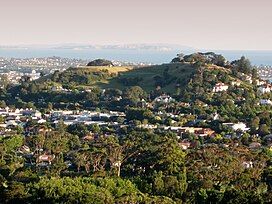Ōhinerau / Mount Hobson
| Ōhinerau / Mount Hobson[1] | |
|---|---|
 Ōhinerau / Mount Hobson as viewed from One Tree Hill. | |
| Highest point | |
| Elevation | 143 m (469 ft) |
| Coordinates | 36°52′40″S 174°47′10″E / 36.877814°S 174.786156°E |
| Geography | |
 | |
| Location | Auckland, North Island, New Zealand |
| Geology | |
| Volcanic arc/belt | Auckland volcanic field |
Ōhinerau / Mount Hobson (also known as Ōhinerangi and Remuwera) is a 143 m high volcanic cone and Tūpuna Maunga (ancestral mountain) in the Auckland volcanic field in Auckland, New Zealand.
Geography
[edit]Located in the Remuera suburb, to the east of the Newmarket commercial suburb, it has been extensively modified by human use, first by Māori for use as a pā and later by use as quarry and pasture land before finally having a water reservoir installed in its cone to supply the surrounding area. An additional, partially buried, water reservoir was built on the low southern side of the mountain in 1955. English oaks and pōhutukawa are the most common trees on the hill.[2]
History
[edit]The name Ōhinerau comes from Hinerau, a goddess of whirlwinds in Māori mythology.[3] The name Mount Hobson comes from Captain William Hobson, the first Governor-General of New Zealand.[4] Remuwera was originally the name of a pā site on the hill that was also utilised for sweet potato and food gardens.[5] The name Remuwera means the burnt edge of a flax garment.[6]
A water reservoir was constructed on the northwestern side of Ōhinerau / Mount Hobson in 1935, damaging the terracing of the pā.[7]
In the 2014 Treaty of Waitangi settlement between the Crown and the Ngā Mana Whenua o Tāmaki Makaurau collective of 13 Auckland iwi and hapū (also known as the Tāmaki Collective), ownership of the 14 Tūpuna Maunga of Tāmaki Makaurau / Auckland, was vested to the collective, including the volcano officially named Ōhinerau / Mount Hobson. The legislation specified that the land be held in trust "for the common benefit of Ngā Mana Whenua o Tāmaki Makaurau and the other people of Auckland". The Tūpuna Maunga o Tāmaki Makaurau Authority or Tūpuna Maunga Authority (TMA) is the co-governance organisation established to administer the 14 Tūpuna Maunga. Auckland Council manages the Tūpuna Maunga under the direction of the TMA.[8][9][10][11][12]
Gallery
[edit]-
View looking northwest over Auckland City from the top of the mountain.
-
Showing the water reservoir installations at the top of the mountain.
-
Kumara pits from when the hill was a Māori pā .
References
[edit]- ^ Tūpuna Maunga o Tāmaki Makaurau Authority (23 June 2016). "Integrated Management Plan" (PDF). Auckland Council. Retrieved 6 October 2021.
- ^ Cameron, Ewen; Hayward, Bruce; Murdoch, Graeme (2008). A field guide to Auckland. Random House. p. 212. ISBN 978-1-86962-151-3.
- ^ Reed, A.W. (1996). The Reed Dictionary of Maori Place Names (Third ed.). Reed Publishing. pp. 67. ISBN 0-7900-0040-7.
- ^ "Place name detail: 31176". New Zealand Gazetteer. New Zealand Geographic Board.
- ^ "NGĀ MANA WHENUA O TĀMAKI MAKAURAU and THE CROWN: NGĀ MANA WHENUA O TĀMAKI MAKAURAU COLLECTIVE REDRESS DEED: DOCUMENTS" (PDF). Archived from the original (PDF) on 24 January 2015. Retrieved 25 October 2014.
- ^ Reed, A.W. (1996). The Reed Dictionary of Maori Place Names (Third ed.). Reed Publishing. pp. 97. ISBN 0-7900-0040-7.
- ^ Cameron, Ewen; Hayward, Bruce; Murdoch, Graeme (2008). A Field Guide to Auckland: Exploring the Region's Natural and Historical Heritage (Revised ed.). Random House New Zealand. p. 212. ISBN 978-1-86962-1513.
- ^ Dearnaley, Mathew (27 September 2014). "Volcanic cones regain Maori names". The New Zealand Herald. Retrieved 25 October 2014.
- ^ "Ngā Mana Whenua o Tāmaki Makaurau Collective Redress Act 2014". New Zealand Legislation. Retrieved 25 October 2014.
- ^ "Ngā Mana Whenua o Tāmaki Makaurau Collective Redress Act 2014 registration guideline" (PDF). Land Information New Zealand. Archived from the original (PDF) on 29 October 2014. Retrieved 25 October 2014.
- ^ "NZGB decisions - September 2014". Land Information New Zealand. Archived from the original on 29 October 2014. Retrieved 25 October 2014.
- ^ Council, Auckland. "Tūpuna Maunga significance and history". Auckland Council. Retrieved 18 July 2022.
- Volcanoes of Auckland: A Field Guide. Hayward, B.W.; Auckland University Press, 2019, 335 pp. ISBN 0-582-71784-1.
External links
[edit]- Photographs of Ōhinerau held in Auckland Libraries' heritage collections.




